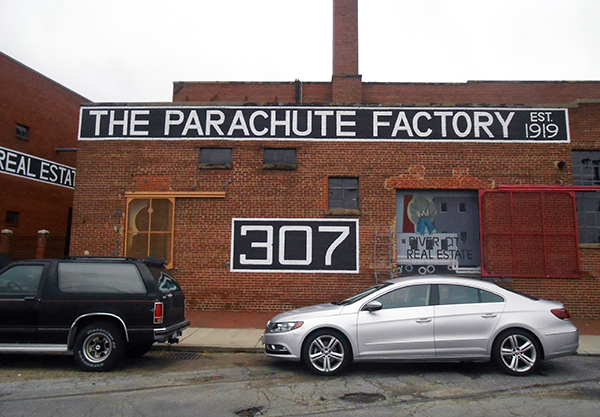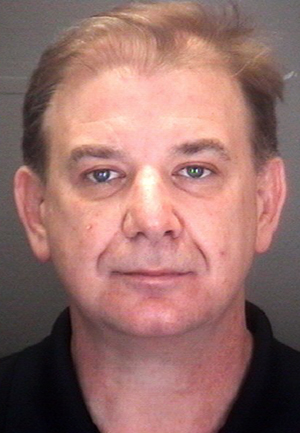Stuck in jail awaiting sentencing for tax credit fraud, Richmond developer Billy G. Jefferson Jr. has another looming problem: a possible foreclosure of one of his apartment properties.
The Parachute Factory Apartments at 307 Stockton St. in Manchester could be headed to the auction block more than eight months after an entity controlled by Jefferson stopped making payments on a $15.2 million mortgage backed by the property.
On Feb. 12, U.S. Bank filed an emergency motion in Richmond Circuit Court to have the 95-unit apartment building turned over to a receiver – a surrogate property manager of sorts – as it said it is pushing toward foreclosure.
The bank, which oversees the commercial loan on the property, argues in the case that Jefferson has “little, if any, incentive” to maximize the building’s cash flow with foreclosure imminent. It also alleges Jefferson has not turned over rental income as is necessary under default and failed to keep the building properly insured.
“There is an imminent and significant risk the defendant has permitted the condition of the property to deteriorate and will continue to do so prior to a foreclosure sale,” the lawsuit alleges.
A special receiver would take over day-to-day operations, such as building upkeep, leasing and rent collection. Charlottesville-based Lenhart Pettit attorney Nancy Schlichting, whose practice includes foreclosures, said the request for a receiver likely means a foreclosure sale is imminent.
“The lender wants somebody to take possession as soon as possible to stabilize the situation and make sure the rents are being paid and collected,” she said.
Russell Drazin, a Washington-based attorney representing the plaintiff, would not comment on the case.
Parachute Factory LC took out a 10-year, $15.2 million loan on the Parachute Factory in 2006, the same year Jefferson and Justin French, another imprisoned local developer, converted the former industrial building into 95 apartments and about 64,000 square feet of ground-level office space.
Wachovia was the original lender on the note, which has a balance of about $13.6 million and is set to mature in November 2016, according to real estate tracking firm Trepp.
Parachute Factory LC made its last payment on the loan in May 2013. The loan was transferred to special servicer CWCapital Asset Management in August, and CWCapital began moving towards foreclosure in November, the Trepp report shows.
The Parachute Factory is still being managed by Historic Property Management, a real estate firm owned by Jefferson. A company representative said Friday that the Parachute Factory has no vacancies. U.S. Bank’s court filing said “it appears that the property is not fully leased. The property was 72 percent occupied according to a Trepp report from March 2013. The Parachute Factory was most recently assessed by the city at $13.83 million.
U.S. Bank’s motion for an emergency receiver states that Historic Property Management is willing to give up control of the Parachute Factory to a receiver, a sentiment echoed by Jefferson’s defense team at a Feb. 21 hearing in federal court related to his criminal case.
Jefferson and French have both seen historic tax-credit scams unravel in recent years. French is serving a 16-year prison sentence. Jefferson is awaiting sentencing for a scheme that could have netted him more than $7 million in fraudulent tax credits.
The two also collaborated on the Tobacco Factory, a 225-unit apartment building four blocks south of the Parachute Factory on Stockton. Cushman & Wakefield | Thalhimer took over property management duties through receivership at that building in January.
Jefferson is in custody at Pamunkey Regional Jail after his bond was revoked Feb. 21. The developer was allowed to remain free on bond after pleading guilty in December to give him a chance to sell off real estate in hopes of raising the almost $13 million he owes in restitution.
Chuck James, a Williams Mullen attorney representing Jefferson in the criminal case, said Friday that Jefferson intends to pay his restitution commitment by selling of a chunk of his Richmond real estate empire, which is assessed at more than $70 million.
Stuck in jail awaiting sentencing for tax credit fraud, Richmond developer Billy G. Jefferson Jr. has another looming problem: a possible foreclosure of one of his apartment properties.
The Parachute Factory Apartments at 307 Stockton St. in Manchester could be headed to the auction block more than eight months after an entity controlled by Jefferson stopped making payments on a $15.2 million mortgage backed by the property.
On Feb. 12, U.S. Bank filed an emergency motion in Richmond Circuit Court to have the 95-unit apartment building turned over to a receiver – a surrogate property manager of sorts – as it said it is pushing toward foreclosure.
The bank, which oversees the commercial loan on the property, argues in the case that Jefferson has “little, if any, incentive” to maximize the building’s cash flow with foreclosure imminent. It also alleges Jefferson has not turned over rental income as is necessary under default and failed to keep the building properly insured.
“There is an imminent and significant risk the defendant has permitted the condition of the property to deteriorate and will continue to do so prior to a foreclosure sale,” the lawsuit alleges.
A special receiver would take over day-to-day operations, such as building upkeep, leasing and rent collection. Charlottesville-based Lenhart Pettit attorney Nancy Schlichting, whose practice includes foreclosures, said the request for a receiver likely means a foreclosure sale is imminent.
“The lender wants somebody to take possession as soon as possible to stabilize the situation and make sure the rents are being paid and collected,” she said.
Russell Drazin, a Washington-based attorney representing the plaintiff, would not comment on the case.
Parachute Factory LC took out a 10-year, $15.2 million loan on the Parachute Factory in 2006, the same year Jefferson and Justin French, another imprisoned local developer, converted the former industrial building into 95 apartments and about 64,000 square feet of ground-level office space.
Wachovia was the original lender on the note, which has a balance of about $13.6 million and is set to mature in November 2016, according to real estate tracking firm Trepp.
Parachute Factory LC made its last payment on the loan in May 2013. The loan was transferred to special servicer CWCapital Asset Management in August, and CWCapital began moving towards foreclosure in November, the Trepp report shows.
The Parachute Factory is still being managed by Historic Property Management, a real estate firm owned by Jefferson. A company representative said Friday that the Parachute Factory has no vacancies. U.S. Bank’s court filing said “it appears that the property is not fully leased. The property was 72 percent occupied according to a Trepp report from March 2013. The Parachute Factory was most recently assessed by the city at $13.83 million.
U.S. Bank’s motion for an emergency receiver states that Historic Property Management is willing to give up control of the Parachute Factory to a receiver, a sentiment echoed by Jefferson’s defense team at a Feb. 21 hearing in federal court related to his criminal case.
Jefferson and French have both seen historic tax-credit scams unravel in recent years. French is serving a 16-year prison sentence. Jefferson is awaiting sentencing for a scheme that could have netted him more than $7 million in fraudulent tax credits.
The two also collaborated on the Tobacco Factory, a 225-unit apartment building four blocks south of the Parachute Factory on Stockton. Cushman & Wakefield | Thalhimer took over property management duties through receivership at that building in January.
Jefferson is in custody at Pamunkey Regional Jail after his bond was revoked Feb. 21. The developer was allowed to remain free on bond after pleading guilty in December to give him a chance to sell off real estate in hopes of raising the almost $13 million he owes in restitution.
Chuck James, a Williams Mullen attorney representing Jefferson in the criminal case, said Friday that Jefferson intends to pay his restitution commitment by selling of a chunk of his Richmond real estate empire, which is assessed at more than $70 million.





